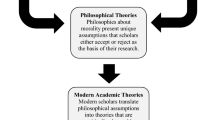Abstract
This paper applies Greco-Roman thinking about wisdom to contemporary business and management practice. The first section outlines the contexts in which Greek and Roman writers referred to wisdom and related terms. Hesiod, Aeschylus, Pericles, Demosthenes, Plato and Aristotle were concerned with sophia and phronésis. Cicero, Horace and Seneca referred to prudentia and sapientia. The second section consists of examples from contemporary business and management behaviour which ranged from the “cunning/clever to the intelligently wise”. Reference is made to current research highlighting concepts such as commonsense wisdom, conventional wisdom, contrarian wisdom and experienced based wisdom.
A wise person knows how to use moral skills in the service of the right aims.1
Similar content being viewed by others
References
Barry Schwartz cited in Rowbotham J (2009) Discipline ought to be grounded in ethics Higher Education The Australian Wednesday November 11 2009 p. 28. 114
Cicero (1981) Cicero Selected Works De Officiis On Duties III (A Practical Code of Behaviour) Penguin Classics p. 211
Franklin B (n.d) The Autobiography of Benjamin Franklin To which is added Jared Sparks’ Continuation (Abridged) London, Hutchinson and Co Hutchinson’s Library of Standard Lives p. 340
Roberts A (2008) Masters and Commanders: How Roosevelt Churchill Marshall and Alanbrooke Won the War in the West Allen Lane Penguin Group, p. 278
Churchill W (2005) The Second World War, Vo VI Triumph and Tragedy Penguin p. x 115
1982 p. 337
The Age Business Day 4 April 2009 p. 1 See also ‘Great Financial Hope: macro prudential supervision The Australian 16 April 2009 p. 26; ‘Trust us: property gets prudent’ The Australian August 31 2009 p. 25
Gallos J (2008) Business Leadership A Jossey-Bass Reader 2nd ed John Wiley and Son 2008 p. 489
ibid pp. 494-495
ibid p. 487
ibid p. 502
ibid p. 115
Leonard, D. and Swap, W.C. (2005) Deep Smarts-How to Cultivate and Transfer Enduring Business Wisdom Boston Massachusetts: Harvard Business School Press
The Australian 16 April 2009
Cowley C (2009) ‘The nun who knew first’ The Table 11 April interview pp. 12-13
Aristotle (1982) Nichomchean Ethics XIX Translated by H. Rackham Loeb Classical Library Cambridge Mass: Harvard University Press p. 343 ff
op.cit. p. 345
op.cit. p. 337 ff
op.cit. p. 341 ff
see Plato 1982 Plato (1982) Republic I Translated by Paul Shorey Loeb Classical Library Cambridge Mass: Harvard University Press p. 348
op.cit. 1982 p. 21
op.cit. p. 349
op.cit. pp. 339-341
op.cit. p. 338
Wender, D. (1977) Hesiod Theogeny Works and Days Theognis Elegies Penguin Books, p. 60
Ibid p. 73
Ibid p. 80
Aeschylus (1949) The Agamemnon by Gilbert Murray London: George Allen& Unwin, p. 8
Demosthenes (1959) Funeral Speech Erotic Essay LX LXI Translated by Norman W and Norman J De Witt Loeb Classical Library Cambridge Mass: Harvard University Press, p. 55 line 21
op.cit. p. 56 line 23
Bowra CM (1952) Ancient Greek Literature London: Oxford pp 141-3
Rutherford R B (1991) The Meditations of Marcus Aurelius A Study Clarendon Press Oxford, p. 15
Franklin B, op.cit., p. 98
Ibid pp. 98, 100, 241
The Australian Financial Review Commentary December 23-28, 2009 p. 63
Laidlaw W A (1951) Latin Literature London: Methuen & Co
Horace (1988) Horace Odes and Epodes Translated by C E Bennett Loeb Classical Library Cambridge Mass: Harvard University Press pp. 65, 113, 191 I
Rutherford op. cit p. 1
Cicero (2005) Cicero On Duties Translated by Walter Miller Loeb Classical Library Cambridge Mass: Harvard University Press
Johnson B (2006) The Dream of Rome BBC TWO Harper Collins Chippenham Wilts pp. 65-68
Cicero (2005) p. 277
ibid p. 173
Cicero (1981), p. 163
Cicero (1957), p. 17
Cicero (2005), p. 157
ibid p. 157
Lewis C T (1987) A Latin Dictionary Oxford: Clarendon Press p. 1629
Cicero (2005), p. 203
Ibid, p. 19
Ibid p. 343
Ibid p. 331, 333
Seneca (1970) Moral Essays Volume I of Three Volumes Translated by John W Basore Loeb Classical Library Cambridge Mass: Harvard University Press pp. 339-41 De Ira III. 36 1
Ryan D (2010) Culturally Adrift Without Classical Moorings A Return to Latin and ancient Greek would make for a real education revolution The Australian, Monday January 11 p. 10
The Age April 25 2009 p. 4
The Age June 18 2009 p. 4
The Australian August 31 2009 p. 1
The Australian June 16 2010 p. 5
The Age June 10 2010 p. 4
Rowbotham (2009), p. 28
Rights and permissions
About this article
Cite this article
Small, M.W. Wisdom, Management and Moral Duty: A Greco-Roman Perspective. Philos. of Manag. 10, 113–128 (2011). https://doi.org/10.5840/pom201110114
Published:
Issue Date:
DOI: https://doi.org/10.5840/pom201110114




